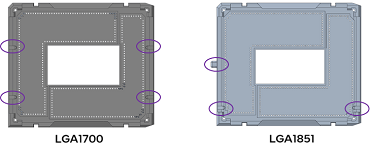Intel® Core™ Ultra Desktop Processors (Series 2) bring a new socket requirement and chipset compatibility considerations. When evaluating the Intel® Core™ Ultra Desktop Processors (Series 2), it's important for users to understand that these processors are not compatible with older platforms.
- Socket: Intel® Core™ Ultra Desktop Processors (Series 2) are designed to fit the new LGA1851 socket to accommodate increased pin count. It's crucial for users to note that, although the LGA1851 socket shares the same size and dimensions as its predecessor, the LGA1700, it is not backward compatible with older sockets. This means that those looking to upgrade to the Intel® Core™ Ultra Desktop Processors (Series 2) will need a new motherboard designed specifically for the LGA1851 socket.

- Chipset: In addition to the new socket, the Intel® Core™ Ultra Desktop Processors (Series 2) are paired with new Intel® 800 Series Desktop Chipsets and are not compatible with older chipsets, such as the Intel® 700 and Intel® 600 Series Desktop Chipsets.
- Thermal Solution: Intel has maintained mechanical compatibility with cooling solutions. The mounting holes for the LGA1700 socket are designed to be mechanically compatible with the LGA1851 socket. For accurate thermal compatibility information, consult with your thermal solution provider directly. For more information visit Thermal Solution Compatibility: LGA1700 and LGA 1851 Sockets.
In summary, the new Intel® Core™ Ultra Desktop Processors (Series 2) utilize the LGA1851 socket, which, despite sharing the same physical size and dimensions, is not compatible with older sockets such as the LGA 1700. Additionally, these processors cannot be used with motherboards featuring the Intel® 700 and Intel® 600 Series chipsets. However, for cooling solutions, the mounting holes from the LGA1700 socket remain mechanically compatible with the LGA1851, meaning that existing thermal solutions designed for LGA1700 can still be used without modification.